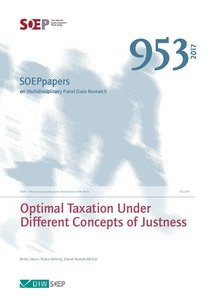Optimal taxation under different concepts of justness
"A common assumption in the optimal taxation literature is that the social planner maximizes a welfarist social welfare function with weights decreasing with income. However, high transfer withdrawal rates in many countries imply very low weights for the working poor in practice. We reconcile t...
| Main Authors: | , , |
|---|---|
| Institution: | ETUI-European Trade Union Institute |
| Format: | TEXT |
| Language: | English |
| Published: |
Berlin
2017
DIW |
| Subjects: | |
| Online Access: | https://www.labourline.org/KENTIKA-19397025124911152079-optimal-taxation-under-differe.htm |
| Summary: | "A common assumption in the optimal taxation literature is that the social planner maximizes a welfarist social welfare function with weights decreasing with income. However, high transfer withdrawal rates in many countries imply very low weights for the working poor in practice. We reconcile this puzzle by generalizing the optimal taxation framework by Saez (2002) to allow for alternatives to welfarism. We calculate weights of a social planner’s function as implied by the German tax and transfer system based on the concepts of welfarism, minimum absolute and relative sacrifice, as well as subjective justness. For the latter we use a novel question from the German Socio-Economic Panel. We find that the minimum absolute sacrifice principle is in line with social weights that decline with net income. Absolute subjective justness is roughly in line with decreasing social weights, which is reflected by preferences of men, West Germans, and supporters of the grand coalition parties." |
|---|---|
| Physical Description: | 33 p. Digital |

